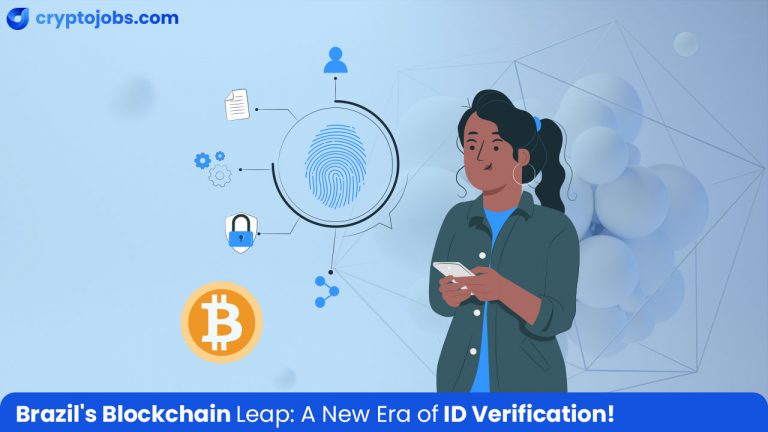
Decentralizing Identity: Brazil’s Blockchain Revolution in National ID Verification!
- cryptojobs.com
- October 2, 2023
- Blockchain, News
- 0 Comments
In a bold stride towards the future, Brazil is making headways in the realm of digital identity verification. The country is unveiling a national ID program, powered by blockchain technology.
With the capacity to reshape the lives of over 214 million Brazilians, this groundbreaking initiative taps into the unparalleled security and decentralization features of blockchain.
The aim?
To completely revamp administrative processes and boost efficiency by leveraging innovative technologies of the 21st century.
As the first states to embrace this technological advancement, Rio de Janeiro, Goiás, and Paraná are leading the charge by issuing on-chain identification documents through a private blockchain developed by Serpro, Brazil’s national data processing service.
This monumental move signifies Brazil’s commitment to enhancing the security and efficiency of its national identity card system.
Let’s look at how blockchain is making these big changes happen.
The Concept of Decentralization
Decentralization is a transformative concept that’s redefining how we think about systems and processes. Imagine a city without a central governing body, where each neighborhood self-manages its affairs, or a business where decision-making powers are distributed across all employees.
This is the essence of decentralization!
The mainstay principle is to shift the control from a single authority to multiple entities. This leads to fostering a system that is transparent and democratic.
Now, let’s apply this process of decentralization on identity verification:
Traditionally, your identity is validated by a central authority – for instance, a government agency issues your ID card or passport.
But what if this process could be decentralized?
Blockchain technology plays a crucial role here. It is the fundamental of decentralization. With blockchain technology, a decentralized identity can be created where individuals can control your data. You can decide who and when you want to share the access of your data and other information.
Your identity isn’t stored in a central database, but rather, it’s distributed across a network of computers. This approach enhances security, as hackers can target no single point of failure.
Brazil’s Blockchain Revolution
Now, imagine an entire country adopting a revolutionary approach to decentralizing identity. That’s exactly what’s happening in Brazil!
Brazil is digitizing its national identity program by utilizing the capabilities of blockchain technology.
The country is leveraging blockchain technology to decentralize its national ID verification system. This means every Brazilian citizen will have a digital ID stored on a blockchain, giving them complete control over their data.
It’s a bold move set to transform governance, redefine privacy, and revolutionize how Brazilians interact with services.
Looking ahead, Brazil isn’t stopping at digital identities. The country is also making strides in blockchain and digital finance with the Drex Digital Currency project. This venture illustrates Brazil’s commitment to leveraging blockchain technology for broader societal transformation.
The Mechanics of Brazil’s Blockchain-Powered Digital ID
The foundation of Brazil’s digital ID initiative is a blockchain platform called b-Cadastros. This sophisticated system takes on the task of searching for and modifying identification cards as well as tax registration numbers.
Rather than having these sensitive pieces of information stored in a central database, they are distributed across a network of computers. This decentralizing identity approach ensures there’s no single point of failure that cybercriminals can exploit.
Moreover, Ethereum powers the Brazil’s digital ID system. The system relies on Ethereum’s smart contract functionality, reducing the risk of fraud and error.
The Advantages and Impact of the Blockchain Revolution
The benefits of Brazil’s blockchain-powered digital ID system are multifaceted.
Firstly, it boosts security to whole new level. By decentralizing identity information, the system becomes less vulnerable to data breaches. Each transaction on the blockchain is not just encrypted but ensured for immutability. What this means is that it cannot be altered or deleted once recorded.
Secondly, it promotes transparency. Every participant has the ability to observe each transaction within the blockchain network.
Lastly, this blockchain-driven ID verification method empowers Brazilian citizens. It hands over control of personal data to the individuals, letting them dictate who can access their information.
With Brazilians surpassing 214 million, this blockchain-based transformation in Brazil’s national ID verification will have a significant effect. It will not only make government procedures more efficient, but it will also improve data protection.
This bold initiative by Brazil will compel other countries to jump on the digital bandwagon.
In summary, the blockchain revolution in Brazil isn’t merely about embracing cutting-edge technology, but fundamentally altering the approach to identity verification – classic case of decentralizing identity!
Conclusion
To sum it up, Brazil’s bold move to integrate blockchain into its National Identity Card project is a game-changer. It is a major leap in modernizing how we view identity infrastructure with the lens of this innovative technology.
This initiative does more than just ramp up data security. It’s also making public services more efficient and accessible, consequently, marking an impressive milestone in Brazil’s technological progress.
As they implement the decentralized identity program, they’re laying down the foundation for a secure, more interconnected world.




